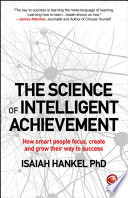

Self-awareness is the cornerstone of intelligent achievement. It involves understanding one's strengths, weaknesses, values, and motivations. This idea emphasizes the importance of introspection and reflection in order to align one's actions with personal goals. The author argues that self-awareness leads to better decision-making and enhances emotional intelligence. By being aware of our thoughts and feelings, we can manage them more effectively, leading to improved relationships and professional success. The process of developing self-awareness can involve journaling, seeking feedback from others, and engaging in mindfulness practices. Ultimately, self-awareness empowers individuals to take control of their lives and make choices that lead to fulfillment and achievement.
Continue readingGoal setting is a vital component of intelligent achievement. The book discusses the importance of setting clear, measurable, and achievable goals. It outlines techniques for effective goal setting, such as the SMART criteria (Specific, Measurable, Achievable, Relevant, Time-bound). The author emphasizes that goals should be aligned with one's values and purpose, creating a sense of direction and motivation. Furthermore, the book highlights the need for flexibility in goal setting, as circumstances may change and adaptations may be necessary. By having well-defined goals, individuals can track their progress, celebrate milestones, and stay focused on their long-term vision, ultimately leading to greater success.
Continue readingEffective decision-making is crucial for intelligent achievement. The book explores various decision-making frameworks and techniques that can help individuals make better choices. It emphasizes the importance of gathering relevant information, weighing options, and considering potential outcomes before making a decision. The author also discusses the role of intuition and emotional intelligence in decision-making, highlighting how these factors can influence our choices. By developing a systematic approach to decision-making, individuals can reduce uncertainty and increase their chances of achieving their goals. The book encourages readers to practice critical thinking and to learn from past decisions, both good and bad, to enhance their future decision-making skills.
Continue readingTime management is a key theme in the book, as it directly impacts productivity and achievement. The author presents various strategies for managing time effectively, such as prioritization, delegation, and the use of tools and technology to streamline tasks. The book emphasizes the importance of distinguishing between urgent and important tasks, allowing individuals to focus on what truly matters. Additionally, the author discusses the concept of time blocking, which involves scheduling specific blocks of time for focused work on particular tasks. By mastering time management, individuals can maximize their productivity, reduce stress, and create a better work-life balance, ultimately leading to greater achievement.
Continue readingCollaboration and networking are essential for intelligent achievement. The book discusses the power of building relationships and working with others to achieve common goals. It emphasizes that no one achieves success in isolation; rather, it is through collaboration that individuals can leverage diverse skills, perspectives, and resources. The author provides insights on how to cultivate meaningful connections, both personally and professionally, and highlights the importance of giving back to one's network. By fostering a spirit of collaboration, individuals can create opportunities for growth, innovation, and mutual success, enhancing their overall achievement.
Continue readingContinuous learning and adaptability are crucial for staying relevant and achieving success in a rapidly changing world. The book encourages readers to adopt a growth mindset, embracing challenges and viewing failures as opportunities for learning. The author discusses the importance of seeking out new knowledge, skills, and experiences, and emphasizes the value of lifelong learning. Additionally, the book highlights the need for adaptability, as the ability to pivot in response to changing circumstances can be a significant advantage. By fostering a culture of continuous learning and adaptability, individuals can remain competitive and innovative, ultimately driving their achievement.
Continue readingResilience and grit are essential qualities for intelligent achievement. The book explores the concept of resilience, which involves the ability to bounce back from setbacks and maintain a positive outlook in the face of adversity. The author emphasizes that resilience can be developed through practice and by adopting a proactive mindset. Grit, on the other hand, refers to the passion and perseverance needed to pursue long-term goals. The book discusses strategies for cultivating resilience and grit, such as setting realistic expectations, maintaining a strong support system, and focusing on incremental progress. By embodying these qualities, individuals can overcome challenges and remain committed to their goals, leading to greater achievement.
Continue readingThe reading time for The Science of Intelligent Achievement depends on the reader's pace. However, this concise book summary covers the 7 key ideas from The Science of Intelligent Achievement, allowing you to quickly understand the main concepts, insights, and practical applications in around 25 min.
The Science of Intelligent Achievement is definitely worth reading. The book covers essential topics including Self-Awareness, Goal Setting, Effective Decision-Making, providing practical insights and actionable advice. Whether you read the full book or our concise summary, The Science of Intelligent Achievement delivers valuable knowledge that can help you improve your understanding and apply these concepts in your personal or professional life.
The Science of Intelligent Achievement was written by Isaiah Hankel.
If you enjoyed The Science of Intelligent Achievement by Isaiah Hankel and want to explore similar topics or deepen your understanding, we highly recommend these related book summaries:
These books cover related themes, complementary concepts, and will help you build upon the knowledge gained from The Science of Intelligent Achievement. Each of these summaries provides concise insights that can further enhance your understanding and practical application of the ideas presented in The Science of Intelligent Achievement.